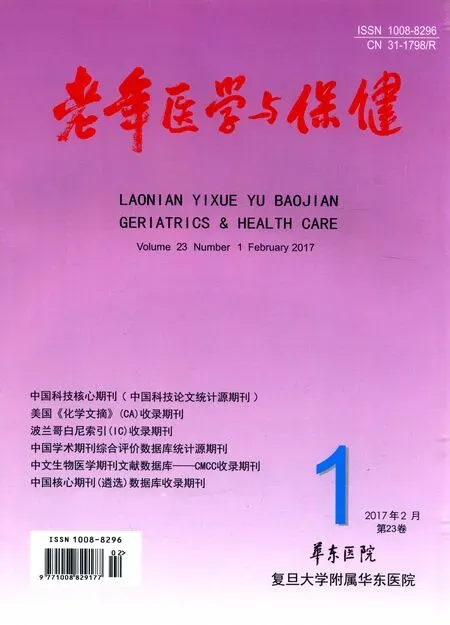遗忘型与血管性轻度认知功能障碍患者认知缺损特征的比较与分析
2017-06-05严峰李伟王涛李霞孙琳肖世富
严峰,李伟,王涛,李霞,孙琳,肖世富
上海交通大学医学院附属精神卫生中心老年科,上海交通大学阿尔茨海默病诊治中心,上海200030
遗忘型与血管性轻度认知功能障碍患者认知缺损特征的比较与分析
严峰,李伟,王涛,李霞,孙琳,肖世富
上海交通大学医学院附属精神卫生中心老年科,上海交通大学阿尔茨海默病诊治中心,上海200030
目的分析遗忘型轻度认知功能障碍(amnesticm ild cognitiveimpairment,aMCI)和血管性轻度认知功能障碍(vascularmild cognitiveimpairment,vMCI)患者认知缺损的特征。方法选取41例老年aMCI患者和38例老年vMCI患者,采用简易精神状态检查量表、蒙特利尔认知评估量表(Montreal cognitive assessment scale,MoCA)和老年成套神经心理测验 (neuropsychologicaltestbattery,NTB)评估患者的认知功能。结果MoCA分测验中,vMCI患者的延迟回忆得分低于aMCI患者NTB分测验中,vMCI患者的听觉词语-延迟回忆1得分低于aMCI患者结论与aMCI患者相比,vMCI患者听觉词语-延迟回忆的损伤更为严重,听觉词语-延迟回忆测验或许可以成为区分vMCI和aMCI的工具。
轻度认知障碍;神经心理学测验;听觉词语-延迟回忆
轻度认知功能障碍(m ild cognitiveimpairment,M CI)是介于正常老龄化与痴呆之间的一个过渡阶段[1]。MCI患者比正常老年人具有更高的痴呆转化风险,其年转化率约为12%[2]。MCI大致可以分为单认知领域受损的遗忘型MCI、多认知领域受损的遗忘型MCI、单认知领域受损的非遗忘型 MCI及多认知领域受损的非遗忘型MCI[3]。不同类型的MCI常合并有不同类型的病理特征,如遗忘型 MCI(单认知领域型/多认知领域型)往往伴有神经退行性病变,而多领域型 MCI(遗忘型/非遗忘型)则表现为血管性损伤[4-5]。目前针对遗忘型轻度认知障碍(amnesticmild cognitive impairment,aMCI)的研究较多[6-7],但有关血管性轻度认知障碍(vascularm ild cognitiveimpairment, vMCI)的研究则处于相对劣势。前期研究发现vMCI患者的注意力、执行功能、运动能力及信息处理能力均有所下降[8],但尚未有研究比较过vMCI和aMCI患者在认知缺损领域上的区别与联系。因此本研究着重探讨vMCI与aMCI认知缺损的特点,并对其进行比较与分析。
1 资料与方法
1.1 研究对象 2012年1月1日—2012年12月31日,从上海市长宁区选取41例老年aMCI患者和38例老年 vMCI患者作为研究对象,年龄60~85岁,平均(74.5±7.4)岁。所有受试者均符合Petersen诊断标准[9],年龄及教育年限差异无统计学意义,见表 1。本研究通过上海交通大学医学院附属精神卫生中心伦理委员会批准,且在项目开展前所有患者及其家属均已签署知情同意书。
1.2 诊断标准
1.2.1 aMCI诊断标准[10](1)总体认知功能正常;(2)患者自觉有记忆减退,或家属、医师认为患者有记忆障碍,病程>3个月;(3)生活及社会功能降低,日常生活能力量表(activities of daily living,ADL)得分≤18分;(4)总体衰退量表(globaldeterioration scale,GDS)评定为2~3级;(5)临床痴呆评定量表(clinicaldementia rating,CDR)评分为0.5;(6)WHO老年成套神经心理测验(neuropsychological testbattery, NTB)的听觉词汇学习测验均值≤-1.5个标准差(根据全国常模,按不同年龄、文化程度的均值);(7)不符合DSM-IV痴呆的标准;(8)Hachinski缺血指数<4分。
1.2.2 vMCI诊断标准[11](1)总体认知功能正常;(2)患者自觉有记忆减退,或家属、医师认为患者有记忆障碍,病程>3个月;(3)生活及社会功能降低,ADL得分≤18分;(4)GDS评定为2~3级;(5)CDR评分为0.5;(6)WHO-BCAI的听觉词汇学习测验均值≤-1.5个标准差(根据全国常模,按不同年龄、文化程度的均值);(7)不符合 DSM-IV痴呆的标准;(8)Hachinski缺血指数≥7分。
所有受试者由2位副高级以上精神科医师进行诊断,疑难病例则由主任医师进行确诊。为了确保诊断的准确性,所有病例均行头颅磁共振检查及血液生化检测。
1.3 纳入标准(1)年龄60~85岁;(2)符合aMCI或vMCI诊断标准。
1.4 排除标准 (1)阿尔茨海默病性痴呆及其他类型痴呆;(2)其他神经退行性病变、脑外伤、癫痫、肿瘤、感染所致的认知障碍;(3)内分泌代谢疾病所致的认知障碍;(4)严重的心血管、肝、肺、肾、造血系统等疾病所致的认知障碍;(5)酒精、吸毒、精神活性药物所致的认知障碍;(6)其他物理、化学因素所致的认知障碍或痴呆。
1.5 认知评估 采用简易精神状态检查量表(m inimental state exam ination,MMSE)、蒙特利尔认知评估量表(Montrealcognitiveassessmentscale,MoCA)和NTB对所有受试者进行认知功能评估。评估人员为特聘的心理评估师。为排除时间对测评结果的影响,将测评时间统一安排在上午9∶00—11∶00,测评地点为安静且光线柔和的心理测评室。
1.6 统计分析 采用SPSS 17.0软件,符合正态分步的数据以均数±标准差(±s)表示,采用独立样本 检验。不符合正态分布的数据以中位数(25%~75%)表示,并采用Man-Whitney检验。<0.05为差异有统计学意义。

表1 一般资料
2 结果
2.1 MMSE分测验比较aMCI患者与vMCI患者MMSE分测验及总分差异无统计学意义。见表2。

表2 aMCI与vMCI患者MMSE分测验比较
2.2 MoCA分测验比较 aMCI患者与 vMCI患者MoCA总分差异无统计学意义,但vMCI患者的延迟回忆得分低于 aMCI患者,差异有统计学意义(<0.05)。见表3。
2.3 NTB分测验比较 vMCI患者在听觉词语-延迟回忆1和听觉词语-延迟回忆2上得分低于aMCI患者,听觉词语-延迟回忆1差异有统计学意义(<0.05)。见表4。

表3 aMCI与vMCI患者MoCA分测验比较
3 讨论
MMSE是老年认知领域常用的评估工具,可用于评估认知损伤的程度,追踪认知随时间的变化,同时反映药物对认知的改善效果[12]。其痴呆筛查的作用已得到公认,但对 MCI的敏感性却只有20%~60%[13]。为了弥补MMSE的缺陷,MoCA被用于临床实践。与MMSE相比,MoCA增加了更多具有挑战性的项目,如执行功能测试和更高水平的语言功能测验等,从而有效的避免了“天花板效应”的产生[14]。尽管MoCA具有很好的 MCI筛查作用,但同样无法全面评估认知功能。NTB是由Gilman等编制,并于2001进入临床试验[15]。与其他的认知筛查工具所不同的是,NTB主要用于评估老年人群的记忆力和执行功能,同时还能全面评估受试者的语言能力、视知觉、注意力、词语记忆和工作记忆[16]。通过联合 MMSE、MoCA和NTB,可以较为全面地评估MCI患者的认知功能,并有助于区分aMCI和vMCI在某些认知领域上的差异。
既往的研究[17-18]提示vMCI患者在语言功能、执行功能及信息处理能力方面的受损比aMCI更为严重,其原因可能与vMCI患者额叶下皮层的神经环路受损有关[19]。本研究中vMCI与aMCI患者在语言功能、执行功能及信息处理能力方面的损害虽有差别,但无统计学意义,考虑原因是vMCI患者的额叶下皮层神经环路受损并不十分严重,有待进一步研究。此次研究结果表明vMCI患者听觉词语-延迟回忆得分1及听觉词语-延迟回忆得分2均低于aMCI患者,可见NTB中的听觉词语测验和MoCA的延迟回忆可以较为有效的区分vMCI和aMCI。听觉词语学习测验侧重于评估言语性情节记忆,vMCI患者在该项得分上较差,说明患者存在较为严重的语言情节记忆损伤,可能与vMCI患者额颞叶萎缩的钩间距更宽有关[20]。而听觉词语测验的延迟回忆可以反映海马的功能状态[21],因此vMCI患者的海马功能是否更差还需要做进一步的研究和探讨。
综上所述,vMCI患者比aMCI患者在NTB的听觉词语-延迟回忆和MoCA的延迟回忆方面损伤更为严重,故听觉词语学习测验和MoCA的延迟回忆可以较为有效的区分vMCI及aMCI。

表4 aMCI与vMCI患者NTB分测验比较
[1]Gauthier S,Reisberg B,ZaudigM,M ild cognitive impairment [J].Lancet,2006,367(9518):1262-1270.
[2]Rhodius-MeesterHF,Koikkalainen J,Mattila J,Integrating Biomarkers for Underlying A lzheimer's Disease in M ild Cognitive Impairment in Daily Practice:Comparison of a Clinical Decision Support System w ith Individual Biomarkers[J].J A lzheimers Dis,2016,50(1):261-270.
[3]Winblad B,Palmer K,Kivipelto M,M ild cognitiveimpairment--beyond controversies,towards aconsensus:report of the International Working Group on M ild Cognitive Impairment[J].J Intern Med,2004,256(3):240-246.
[4]Petersen RC,Doody R,Kurz A,Current concepts in m ild cognitive impairment[J].Arch Neurol,2001,58(12):1985-1992.
[5]LoBueC,Denney D,Hynan LS,Self-Reported Traumatic Brain Injury and M ild Cognitive Impairment:Increased Risk and Earlier Ageof Diagnosis[J].J A lzheimers Dis,2016,51(3): 727-736.
[6]Hahn C,LeeCU,WonWY,Thalam ic Shapeand Cognitive Performance in Amnestic M ild Cognitive Impairment[J].Psychiatry investig,2016,13(5):504-510.
[7]BlancoME,UgarrizaSI,Elcoroaristizabal MX,Dysexecutive syndrome in amnesic m ild cognitive impairment:a multicenter study[J].BMC Neurol,2016,16:88.
[8]Salvadori E,Poggesi A,Valenti R,Operationalizing m ild cognitive impairment criteria in small vessel disease:the VMCITuscany Study[J].A lzheimersDement,2016,12(4):407-418.
[9]Petersen RC.M ild cognitive impairment asadiagnosticentity[J]. J Intern Med,2004,256(3):183-194.
[10]M cKhann G,Drachman D,FolsteinM,Clinical diagnosis of A lzheimer's disease:report of the NINCDS-ADRDA Work Group under the auspices of Department of Health and Human Services Task Force on A lzheimer's Disease[J].Neurology, 1984,34(7):939-944.
[11]Winblad B,Palmer K,Kivipelto M,M ild cognitive impairment--beyond controversies,towards a consensus:report of the International Working Group on M ild Cognitive Impairment [J].J Intern Med,2004,256(3):240-246.
[12]O’Bryant SE,Humphreys JD,Sm ith GE,Detecting dementia w ith the m ini-mental state exam ination in highly educated individuals[J].A rch Neurol,2008,65(7):963-967.
[13]Piccinin AM,Muniz-TerreraG,Clouston S,Coordinated analysis of age,sex,and education effects on change in MMSE scores[J].JGerontol SPsycholSciSoc Sci,2013,68(3):374-390.
[14]Tiffin-RichardsFE,CostaAS,Holschbach B,TheMontreal CognitiveAssessment(MoCA)-asensitivescreening instrument for detecting cognitive impairment in chronic hemodialysis patients[J].PLoS One,2014,9(10):e106700.
[15]Gilman S,Koller M,Black RS,ClinicaleffectsofAbeta immunization(AN1792)in patients w ith AD in an interrupted trial[J].Neurology,2005,64(9):1553-1562.
[16]Harrison J,M inassian SL,Jenkins L,A neuropsychological test battery for use in A lzheimer disease clinical trials[J].Arch Neurol,2007,64(9):1323-1329.
[17]Looi JC,Sachdev PS.Differentiation of vascular dementia from AD onneuropsychological tests[J].Neurology,1999,53(4): 670-678.
[18]Graham NL,Emery T,Hodges JR.Distinctivecognitiveprofiles in A lzheimer’sdisease and subcortical vasculardementia[J].J Neurol Neurosurg Psychiatry,2004,75(1):61-71.
[19]O'Brien JT,Erkinjuntti T,Reisberg B,Vascularcognitive impairment[J].Lancet Neurol,2003,2(2):89-98.
[20]Saka E,Dogan EA,Topcuoglu MA,Linear measures of temporal lobe atrophy on brain magnetic resonance imaging (MRI)but not visual rating ofwhitematter changes can help discrim inationofm ild cognitive impairment(MCI)and A lzheimer's disease(AD)[J].ArchGerontol Geriatr,2007,44(2):141-151.
[21]Balthazar ML,YasudaCL,Cendes F,Learning,retrieval, and recognitionarecomprom ised inaMCI and m ild AD:are distinct episodic memory processes mediated by the same anatomical structures[J].J Int NeuropsycholSoc,2010,16(1):205-209.
Comparison and Analysis of the Characteristics between the Patients w ith aMCI and the Patients w ith vMCI
Yan Feng,Li Wei,Wang Tao,Li Xia,Sun Lin,Xiao Shifu*
Department of Geriatrics,Mental Health Center A ffiliated to Medical School,Shanghai Jiao Tong University/Alzheimer's Disease and Related Disorders Center(ADRDC)of Shanghai Jiao Tong University,Shanghai,200030,P.R.China
Objective Toanalyze the characteristicsofcognitive impairmentof thepatients w ithamnestic mild cognitive impairment(aMCI)and the patients w ith vascular mild cognitive impairment(vMCI).Methods 41 patients w ith aMCI and 38 patients w ith vMCI were selected and M ini Mental State Examination (MMSE),Montreal Cognitive Assessment Scale (MoCA)and Neuropsychological TestBattery(NTB)wereapplied inassessing thecognitive functionofallthepatients.Results There existed a statistical difference in auditory verbal learning test between the patients w ith aMCI and the patients w ith vMCI, MoCAand NTBConclusions The impairment of auditory verbal-delayed recall in patients w ith vMCI is more severe than that in patients w ith aMCI,which may be taken as a tool to distinguish vMCI from aMCI.
m ild cognitive impairment;neuropsychological test;auditory verbal learning test
2016-10-28)
( 本文编辑:朱音)
十一五国家科技支撑计划(2009BAI77B03)
肖世富,电子信箱:xiaoshifu@msn.com
*Corresponding author:Xiao Shifu,E-mail:xiaoshifu@msn.com
